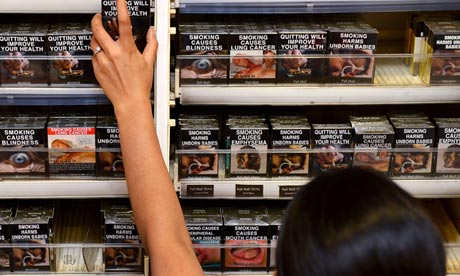
Tobacco companies could be forced to display graphic images of diseased body parts on cigarette packets under new rules to discourage smoking that David Cameron is examining.
The prime minister, who is a former smoker, told MPs that he was looking "across the piece" at ideas which could also include imposing a ban on smoking in cars when children are present.
Cameron cited rules in Australia where tobacco companies are banned from placing their company logo on cigarette packets, which are instead covered with pictures of body parts diseased by smoking. These include colour photographs of feet damaged by gangrene and pictures of eyes blinded by smoking.
The prime minister told MPs: "We are looking across the piece at all the issues, including whether we should follow the Australians with the ban on packaging and what more we can to do to restrict smoking in public places. There has been a real health advance from some of the measures that have been taken. We must consider each one and work out whether there is a real public health benefit."
Cameron's intervention came after Anna Soubry, the public health minister, said she favoured banning smoking in cars if children are present. "I would do that for the protection of children," she told the Local Government Association's annual public health conference this week.
On Friday MPs will consider a private member's bill, sponsored by the Labour MP Alex Cunningham and the Tory peer Lord Ribeiro, that would ban smoking in cars when children are present. Cunningham told MPs in November that research by the University of Waterloo in Canada provided "compelling evidence" that a single cigarette smoked in a car is more dangerous to a child than standing in a smoke-filled pub.
The MP for Stockton North told MPs in November: "I have said that this is not just a health issue, but a child protection issue. Children are much more vulnerable to secondhand smoke: they are still physically developing; compared with adults, they breathe into smaller lungs more quickly; their absorption of pollutants is greater; and their less developed immune systems make them prone to respiratory and ear infections."
Government sources said that the prime minister is open to new ideas because he believes that the ban on smoking in public places has had a beneficial effect on health.
One source said: "The prime minister thinks the smoking ban, as it currently exists, has had important public health benefits. He is struck by the evidence so it is logical for us to look at areas where we may go further. The prime minister was indicating genuine interest."
The prime minister made his remarks in response to a question from the Labour MP Ian Mearns, who asked him about the private member's bill. Cameron mentioned the Australian packaging rules without being prompted and aides said he was interested in the suggestion about smoking in cars.
"The prime minister is genuinely interested in exploring the type of idea [Ian Mearns] suggested," the source said, but added that changes are unlikely to be introduced imminently.
"The prime minister was not signalling an immediate jump to a decision … It was not just a holding answer, nor are we putting a timetable on it."
Cameron said in 2011 that he was "nervous" about legislating for what people do inside their own cars. At the same time he expressed support for the smoking ban in public places, having previously opposed the measure.
Dr Penny Woods, chief executive of the British Lung Foundation (BLF), said: "The case for a ban on smoking in cars is now unarguable. Since the BLF began this campaign in 2010, we've had overwhelming support from the public, from politicians – and now from the government's own health minister. Unfortunately, since then, children's exposure to secondhand smoke has resulted in 800,000 primary care consultations, 440,000 new episodes of disease and 25,000 hospital admissions."

